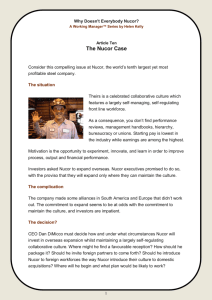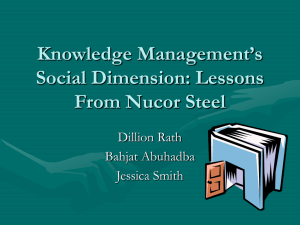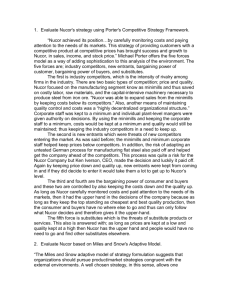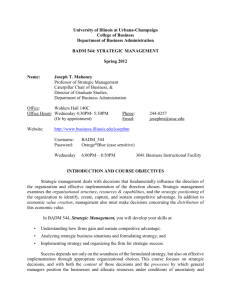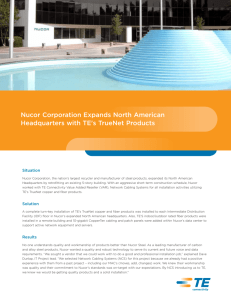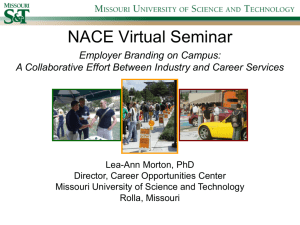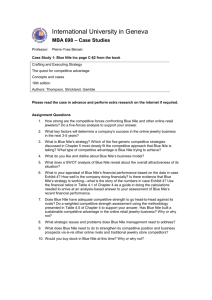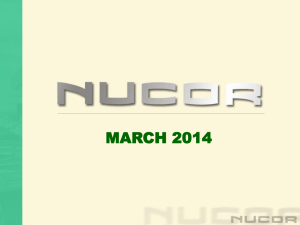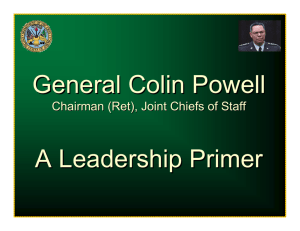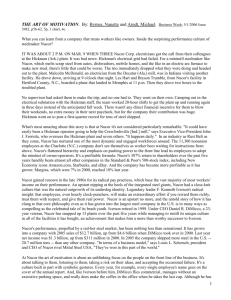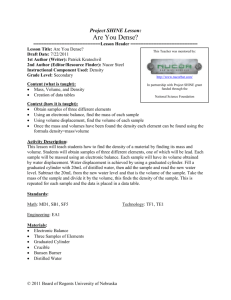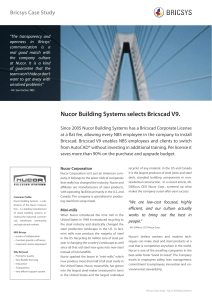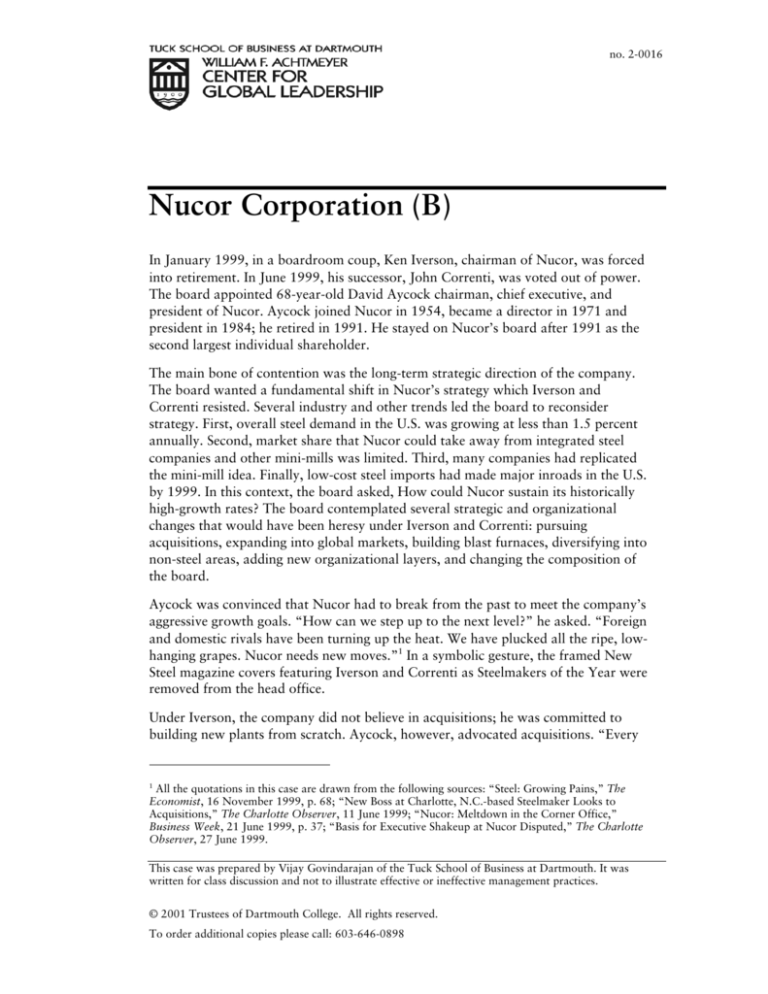
no. 2-0016
Nucor Corporation (B)
In January 1999, in a boardroom coup, Ken Iverson, chairman of Nucor, was forced
into retirement. In June 1999, his successor, John Correnti, was voted out of power.
The board appointed 68-year-old David Aycock chairman, chief executive, and
president of Nucor. Aycock joined Nucor in 1954, became a director in 1971 and
president in 1984; he retired in 1991. He stayed on Nucor’s board after 1991 as the
second largest individual shareholder.
The main bone of contention was the long-term strategic direction of the company.
The board wanted a fundamental shift in Nucor’s strategy which Iverson and
Correnti resisted. Several industry and other trends led the board to reconsider
strategy. First, overall steel demand in the U.S. was growing at less than 1.5 percent
annually. Second, market share that Nucor could take away from integrated steel
companies and other mini-mills was limited. Third, many companies had replicated
the mini-mill idea. Finally, low-cost steel imports had made major inroads in the U.S.
by 1999. In this context, the board asked, How could Nucor sustain its historically
high-growth rates? The board contemplated several strategic and organizational
changes that would have been heresy under Iverson and Correnti: pursuing
acquisitions, expanding into global markets, building blast furnaces, diversifying into
non-steel areas, adding new organizational layers, and changing the composition of
the board.
Aycock was convinced that Nucor had to break from the past to meet the company’s
aggressive growth goals. “How can we step up to the next level?” he asked. “Foreign
and domestic rivals have been turning up the heat. We have plucked all the ripe, lowhanging grapes. Nucor needs new moves.”1 In a symbolic gesture, the framed New
Steel magazine covers featuring Iverson and Correnti as Steelmakers of the Year were
removed from the head office.
Under Iverson, the company did not believe in acquisitions; he was committed to
building new plants from scratch. Aycock, however, advocated acquisitions. “Every
1
All the quotations in this case are drawn from the following sources: “Steel: Growing Pains,” The
Economist, 16 November 1999, p. 68; “New Boss at Charlotte, N.C.-based Steelmaker Looks to
Acquisitions,” The Charlotte Observer, 11 June 1999; “Nucor: Meltdown in the Corner Office,”
Business Week, 21 June 1999, p. 37; “Basis for Executive Shakeup at Nucor Disputed,” The Charlotte
Observer, 27 June 1999.
This case was prepared by Vijay Govindarajan of the Tuck School of Business at Dartmouth. It was
written for class discussion and not to illustrate effective or ineffective management practices.
© 2001 Trustees of Dartmouth College. All rights reserved.
To order additional copies please call: 603-646-0898
Nucor Corporation (B)
no. 2-0016
company hits a plateau. You just can’t go out and build new plants to grow,” he said.
With steel prices down in 1999, he believed firms could be acquired at bargain prices
and was looking at several companies, including Gallatin Steel in Kentucky.
Iverson kept Nucor a domestic company, partly because he was concerned about
exporting the company’s unique culture to foreign locations. In contrast, Aycock
expressed the following perspective on global expansion: “Steel is not just a local
market anymore, and our product must be global.” According to Aycock, Nucor’s
future growth hinged on its ability to enter South America and Asia using local
partners.
Iverson pioneered the mini-mill concept. Aycock wanted to build blast furnaces, the
hallmark of integrated steel producers, noting, “Blast furnaces can deal with a
weakness that could become critical as the firm grows. Unlike integrated firms, which
use pig iron produced by blast furnaces, mini-mills rely on scrap metal. A blast
furnace can diminish the firm’s reliance on the notoriously fickle scrap market. It is a
terrible misconception that integrated firms have to stay ‘integrated’ and mini-mills
must stay ‘mini.’”
Iverson’s policy was to be a single industry player, concentrating on steel and steelrelated products. Aycock insisted that Nucor consider diversifying beyond steel. “It’s
ridiculous to think we can keep growing this company just in steel and steel
products,” he said. “The firm’s base can be expanded beyond steel to other
manufacturing areas where the Nucor model will work.” John Tumazos, a longtime
steel analyst with Sanford C. Bernstein, remarked, “Nucor would likely look at
manufacturing setups similar to Nucor’s joist business—nonunion shops with a team
production concept or a product adaptable to Nucor’s team system. I expect they will
be in manufactured products that are philosophically like a joist line, where you are
paying a bunch of guys based on the unit output of the team and they are pulling
together like a crew.”
Iverson took pride in overseeing the operations of about 25 plants with lean corporate
staff. Aycock emphasized the need to add more management layers. As he explained,
“When Nucor was a niche player, Iverson’s intuitive style served it well. But with
revenues now exceeding $4 billion—and the company on track to become the largest
steelmaker in output—it was time for more long-term planning. Our size means the
boss simply can’t know everything that goes on. Each top executive must have no
more than seven plant managers reporting to him. This will mean better oversight and
monitoring of costs. It may also provide a broader base of talent to succeed me.” In
November 1999, the company added two executive vice presidents between Aycock
and the plant managers.
The composition of the board also changed. Iverson’s board consisted of current and
former Nucor employees. Aycock recruited outside the company; by November 1999,
outside directors made up two-thirds of Nucor’s board.
Tuck School of Business at Dartmouth – William F. Achtmeyer Center for Global Leadership
2
Nucor Corporation (B)
no. 2-0016
Discussion Questions
1. Do you agree that Nucor must undergo a deep change to survive and prosper
in the twenty-first century? How do you evaluate the specific shifts in
strategy?
2. Can Nucor preserve its unique culture and control systems under its new
strategic direction?
3. Would you like to work for Nucor under David Aycock?
Tuck School of Business at Dartmouth – William F. Achtmeyer Center for Global Leadership
3

